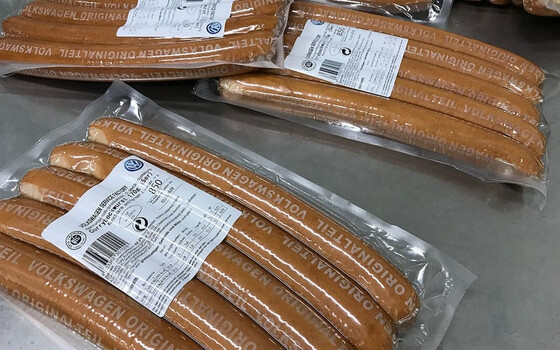
Wolfsburg, Germany – Volkswagen, the German automotive giant, is making headlines not just for its cars, but for its burgeoning sausage business. In a surprising turn, the company’s culinary division is proving to be a surprising success, even as its core automotive sales face headwinds.
According to Volkswagen, a staggering 8.55 million sausages were sold last year, significantly outpacing the 5.2 million Volkswagen brand vehicles sold globally. This volume nearly matches the entire Volkswagen Group's vehicle sales, which stood at 9.03 million units when including brands like Audi, Porsche, and Skoda. This remarkable performance has led to speculation that the humble sausage could become a crucial revenue stream for the automaker.
Expanding Beyond the Canteen: Ready-to-Eat Sausages Hit Supermarkets
Riding on this momentum, Volkswagen recently announced the launch of a ready-to-eat version of its famed currywurst sausage, carrying its own brand. German media reported that these microwaveable currywurst will be available in supermarkets across northern Germany starting next month. Dietmar Schulz, head of Volkswagen's sausage division, expressed confidence, stating, "We are convinced that the sales network will rapidly expand beyond the northern German region."
Volkswagen has been producing its own sausages in-house since 1973. Initially, these culinary creations were intended solely for internal consumption within company canteens. However, their popularity soon grew, leading to their sale in select supermarkets, primarily around the company's headquarters in Lower Saxony. The new ready-to-eat currywurst marks a significant expansion, as previous versions required cooking or boiling at home. Each Volkswagen sausage even bears a unique "part number," just like its automotive counterparts: '199 398 500 A', a nod to the company's engineering roots.
Economic Diversification Amidst Automotive Challenges
Financial news outlets like Finanzen observe that as the automotive industry grapples with numerous challenges, Volkswagen is doubling down on food innovation to boost revenue. The publication suggests that "in addition to cars, sausages could become a major source of revenue for Volkswagen. Given the impressive sales figures and plans for nationwide expansion, the market will carefully monitor trends in the sausage division."
Indeed, the global automotive sector is navigating a complex landscape. The much-hyped electric vehicle (EV) transition is experiencing a temporary slowdown, often referred to as an "EV chasm." This is compounded by policy shifts in key markets like the United States, where environmental vehicle policies are showing signs of retraction, coupled with broader policy uncertainties. These factors are prompting major global automakers, including Volkswagen, to re-evaluate and adjust their electrification strategies.
Rebalancing the Electrification Strategy
Global automotive giants are recalibrating their investments, increasing focus on hybrid electric vehicles (HEVs) and internal combustion engine (ICE) vehicles, while simultaneously lowering EV sales targets. This signifies a more measured pace for the full electrification transition.
Volkswagen Group, the world's second-largest automaker by global sales volume after Toyota, is no exception. The company has revised its ambitious plans to invest 180 billion euros (approximately $195 billion USD) in electric vehicles over five years starting from 2023. Instead, it now plans to allocate a substantial 60 billion euros (approximately $65 billion USD) towards internal combustion engine technology. As Arno Antlitz, CFO and COO of Volkswagen Group, succinctly put it, "The future is electric, but the past is not over."
Navigating Geopolitical and Market Headwinds
Beyond the strategic shifts in powertrain development, Volkswagen Group faces additional external pressures. Its relatively low local production ratio in the United States, at just 24% compared to some competitors, makes it more directly exposed to potential protectionist trade policies, such as those related to tariffs. This geopolitical vulnerability adds another layer of complexity to the company's global strategy.
The shift in focus towards a more diversified product portfolio, including unexpected ventures like advanced food production, highlights a pragmatic approach by Volkswagen to secure revenue streams and adapt to a dynamic global economic environment. Whether the "currywurst comeback" will genuinely elevate the sausage to a primary profit center remains to be seen, but it certainly offers a unique perspective on corporate resilience and innovation in times of change.
[Copyright (c) Global Economic Times. All Rights Reserved.]






























